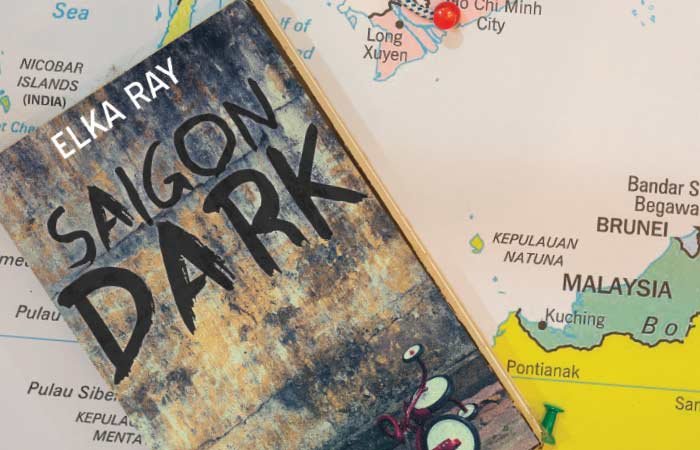Elka Ray discusses “Saigon Dark” with Asialife Magazine
Elijah Ferrian reads Elka Ray’s new novel, and gets into some of the deeper themes running throughout the story. Part macabre mystery, part heartwarming tale of love and the importance of family and identity.
Photo by Vinh Dao.
Elka Ray released a new novel, and it’s quite an edgy tale. This writer, born in England, raised in Africa and Canada, and absorbing everything Southeast Asia for the last twenty years, has created something quite unique.
Previously, Ray had focussed on short stories, and writing and illustrating a trio of kids’ books. She also is the co-owner of a souvenir production company, Sticky Rice, that likes to craft its products with the storied cultures of Southeast Asia firmly in mind.
The new novel, Saigon Dark, is a far cry from a children’s novel, or really any of her previous work to date. This is a tale of duality. Yin and yang. The dark side of life that we all experience at some point, and the light side that comforts us, as if we were back in a familiar womb of warmth and safety. It explores themes of lies, deceit, grief, identity, mental health, and the shadow self that we all possess. Is it better to keep it hidden, or to unleash it for all to see? Carl Jung certainly had a lot to say about all of this, but we’ll keep this short.
We wanted to get a bit deeper into some of the concepts in the book, without exposing too much of the story. I had a little back-and-forth with the author to get down to the bottom of what is unconsciously going on in this story:
How much, if any, of this story is autobiographical? Obviously some things are fantastical, but there seems to be a few threads of first-hand experience throughout this story.
Going on ten years ago, my first child died unexpectedly as a baby. It was my first major loss, and I had no clue how grief worked. I felt obliged to act fine, to not make other people uncomfortable. But then I’d crack, like I’d go to the supermarket and see the diaper aisle and start bawling. It was awful. For the first time in my life I couldn’t control my emotions.
Grief made me feel crazy and that terrified me. As a writer, it fascinated me too – the irrationality of it. My sobbing wouldn’t help; being sad wouldn’t bring my daughter back. Wanting to understand grief was the basis for Saigon Dark – a novel about a woman who’s crazed with grief, but has to pretend she’s fine. From what I experienced, pretending is the worst. It really might drive you mad.
What’s your background? When did you come to Vietnam? Why? Have you lived in all of the locations touched on in the book?
I moved to Vietnam on New Year’s Eve 1994/’95. I came “for one year”, planning to pursue a PhD in Asian Studies. Instead, I started writing for magazines and abandoned academia. The novel is set in Ho Chi Minh City and Hanoi, both cities I called home for many years.
Do you have children of your own? If so, how has it been raising them in Vietnam? The ups and downs?
I have a son, aged 9, and a daughter who’s almost 8. My kids’ grandparents are Vietnamese, German and British. I’m Canadian and my husband’s Australian. If we left Vietnam I’m not sure where we’d go. A year and a half ago we moved from Ho Chi Minh City to the beach near Hoi An. We wanted our kids to have cleaner air and more access to nature.
How long was this story in the making? Has this been something you have been building up for quite some time? Or is it a different case of it just kind of pouring out of you into this novel?
The first draft took four or five months, but I knew the characters and story well before I started writing. The rewriting took longer, as it usually does.
The plot of Saigon Dark came to me shortly after my son was born in Thailand. His first passport featured a photo taken as a newborn. He was squinty, toothless and bald. From the photo you couldn’t guess his race or gender. That passport was valid for five years, which got me thinking: I could use this passport for any kid.
I find the dream-state, “Is this really happening?”, theme that weaves through the story quite interesting. Can you touch more on why you chose to use this theme to tell the story?
This stems from my own experience of trauma. When something really terrible happens, you go into shock. Your feelings are muffled and your reasoning is impaired. It’s like soft focus. When you look back, your memories are disjointed. Now imagine you can’t discuss those shattering events with anyone. The main character of Saigon Dark, Lily, faces trauma after trauma – all stemming from a decision she made in the throes of grief and shock.
Reposted from AsiaLife Magazine

